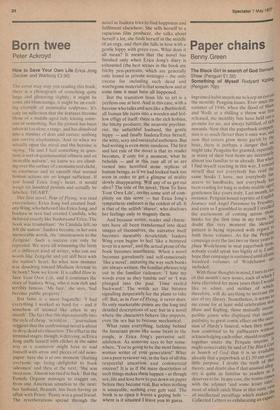Born twee
Peter Ackroyd
How to Save Your Own Life Erica Jong (Secker and Warburg 0.90) The cover may stop you reading this book; there is a photograph of something quite large and glistening, slightly; it might be some old blancmange, it might be an exciting example of minimalist sculpture. It's only on reflection that the features become those of a middle-aged lady kissing someone or something. But the picture has been taken at too close a range, and has dissolved into a number of dots and curves: nothing can survive elephantisis. And so when we actually open the novel and the heroine is saying, He and I had something in question: a sort of quintessential silliness and an incurable naivete', we know we are climbing over the surface of a monumental cliche, so enormous and so smooth that normal human actions are no longer sufficient. If you found Erica Jong's heart, it would weigh six hundred pounds and actually be labelled 'HEART.'
Her first novel, Fear of Flying, was read everywhere: Erica Jong had created Isadora Wing, who behaved like EricaJong, and Isadora in turn had created Candida, who behaved exactly like Isadora and Erica. The book was triumphant: 'As Candida felt, so felt the nation'. Isadora became, in her own memorable words, the 'amaneuensis to the Zeitgeist'. Such a success can only be repeated. We were all witnessing the birth of a different kind of writer, who can use words like Zeitgeist and yet still beat with the nation's heart. So what new monster• was slouching toward Madison Avenue to be born? Now we know. It is called How to Save Your Own Life, and it continues the story of Isadora Wing, who is now rich and terribly famous. `My face,' she says, .'had become public property.'
But fame is a mere bagatelle: I had everything I worked so hard for – and it somehow all seemed like ashes in my mouth'. The fact that this slips naturally into the style of cheap, 'as told to. .'journalism suggests that the confessional novel is about to drop dead of exhaustion. The effect in the terminal stages, though, is dizzying, as Erica Jong stuffs herself with cliches in the same way as a scarecrow might have to wad himself with straw and pieces of old newspaper: here she is at one moment 'chatting everyone -up, being delightful to book salesmen' and then at the next, 'She was tired now. Almost too tired to fuck.' But the Female Orgasm manages to stagger on, from one American situation to the next: her husband, Bennett, has been having an affair with Penny. Penny was a good friend. The reverberations spread through the
novel as Isadora tries to find happiness and fulfilment elsewhere. She sells herself to a rapacious film producer, she talks. about herself a lot, she finds herself in the middle Of an orgy, and then she falls in love with a gentle hippy with green eyes. What does it all mean? It means that the novel has finished only when .Erica Jong's diary is exhausted (the best scenes in the book are bitchy pen-portraits, which are generally only found in private writings) – the only excuse for including such dead and woebegone material is that somehow and at some time it must have all happened. But the transition from life to art is a perilous one at best. And in this case, with a heroine who talks and acts like a Barbiedoll, all human life turns into a wooden and hollow effigy of itself: there is the rich lesbian, the bitchy producer, the neurotic psychiatrist, the unfaithful husband, the gentle hippy — and finally Isadora/Erica herself, the witty, sexy and successful authoress. But bad writing is even more insidious. The first and last rule of the novel is that its reader becomes, if only for a moment, what he beholds — and in this case all of us are turned into horrified stone replicas of human beings, as if we had looked back too soon in order to get a glimpse of reality slowly disappearing. Will any of us get out alive? The title of the novel, 'How To Save Your Own Life', invites some sort of complicity on this score — but Erica Jong's sympathetic embrace is the coldest of all. It is that of the selfish 'sharer', who discloses her feelings only to magnify them.
And because writer, reader and characters have all been transformed into dead images of themselves, the narrative itself becomes incurably novelettish. Isadora Wing even begins to feel 'like a betrayed lover in a novel', and the actual prose of the book becomes inauthentic. When a novel becomes garrulously and self-consciously like a novel', imitating the way such books are always written, the familiar phrases trip out in the familiar cadences: `I hate my words even as they tumble out' or 'I was plunged into the past. Time reeled backward.' The words act like batmen signalling desperately for the plane to take off. But, as in Fear of Flying, it never does. Its only marketable points are the long and detailed descriptions of sex: but in 'a novel where the characters behave like puppets, even the sex has to become mechanical.
What ruins everything, lurking behind the luxuriant prose like some beast in the jungle, is Erica Jong's pervasive selfadulation. As someone says to her somewhere, 'You're going to be the most famous woman writer of your generation!' What can a poor reviewer say, in the face of all this respectful attention and commercial success? It is as if the mere description of such things makes them happen – as though sex, life and love have to put down on paper before they become real. But when nothing is unsayable, nothing ever gets said. The book is so open it leaves a gaping hole — where is it situated I leave you to guess.






































 Previous page
Previous page